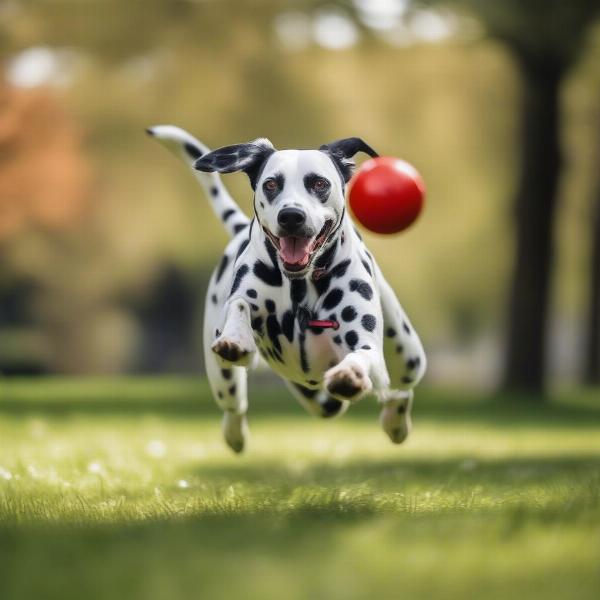Dalmatian dogs, known for their unique spotted coat, are a popular breed worldwide. But beyond their striking appearance, what does it truly mean to own a “polka dot dog”? This comprehensive guide dives into everything you need to know about Dalmatians, from understanding their temperament and health needs to providing proper training and care. Whether you’re a seasoned dog owner or considering welcoming a Dalmatian into your family, this article will equip you with the knowledge to ensure a happy and healthy life for your spotted companion.
Dalmatian Temperament and Personality: More Than Just Spots
Dalmatians are energetic, intelligent, and playful dogs. They thrive on human companionship and are known for their loyal and affectionate nature. However, their high energy levels require consistent exercise and mental stimulation. A bored Dalmatian can quickly become destructive or develop behavioral issues. They are generally friendly with other dogs and people, but early socialization is crucial to ensure they grow into well-adjusted adults. Their intelligence makes them quick learners, but they can also be independent and strong-willed, requiring patient and consistent training.
 Dalmatian playing fetch in a park
Dalmatian playing fetch in a park
Dalmatian Health: Common Concerns and Preventative Care
While generally healthy, Dalmatians are prone to certain health conditions. Deafness is a significant concern, with a higher incidence in this breed than in others. Regular hearing tests are essential, especially for puppies. Another common issue is urinary stones, due to their unique uric acid metabolism. A diet specifically formulated for Dalmatians is crucial to prevent this problem. Hip dysplasia and certain skin allergies are also potential health risks. Choosing a reputable breeder who screens for these conditions can significantly reduce the risk in your Dalmatian.
Training Your Polka Dot Dog: Tips and Techniques
Training a Dalmatian requires patience, consistency, and positive reinforcement. Their intelligence makes them capable of learning complex commands, but their independent streak can sometimes make them challenging. Early socialization is vital to expose them to various people, places, and situations, helping them develop into well-rounded adults. Enrolling in obedience classes can be beneficial, providing professional guidance and socialization opportunities.
Feeding Your Dalmatian: Nutritional Needs and Diet Recommendations
Dalmatians require a high-quality diet that addresses their unique metabolic needs. Due to their predisposition to urinary stones, a low-purine diet is essential. Avoid foods high in purines, such as organ meats and certain types of seafood. Commercial dog foods specifically formulated for Dalmatians are readily available and often the best choice. Always consult with your veterinarian to determine the best diet plan for your individual dog, considering their age, activity level, and overall health.
Grooming Your Spotted Friend: Keeping that Coat Gleaming
Dalmatians have a short, dense coat that requires regular brushing to remove loose hair and keep it looking its best. While they don’t require frequent bathing, occasional baths are necessary to maintain cleanliness. Regular nail trimming and ear cleaning are also essential parts of their grooming routine.
Exercising Your Dalmatian: Keeping Them Active and Happy
Dalmatians are high-energy dogs that require plenty of exercise to stay physically and mentally stimulated. Daily walks, runs, or playtime in a fenced yard are essential. They also excel in dog sports like agility and flyball, which provide both physical and mental challenges. Failing to meet their exercise needs can lead to boredom, destructive behavior, and other issues.
Conclusion: Welcoming a Polka Dot Dog into Your Life
Owning a Dalmatian is a rewarding experience for those prepared to meet their unique needs. By understanding their temperament, health considerations, and training requirements, you can provide your spotted companion with a happy, healthy, and fulfilling life. Remember that consistent care, training, and plenty of love are essential to building a strong bond with your Dalmatian.
FAQ
- Are Dalmatians good with children? Dalmatians can be good with children, especially if raised with them from puppyhood. However, their energetic nature requires careful supervision, especially around young children.
- How much exercise does a Dalmatian need? Dalmatians need a significant amount of exercise, at least an hour or two per day. This can include walks, runs, or playtime in a secure area.
- What is the lifespan of a Dalmatian? The average lifespan of a Dalmatian is 11-13 years.
- Are Dalmatians hypoallergenic? No, Dalmatians are not hypoallergenic. They shed moderately throughout the year.
- Do Dalmatians bark a lot? Dalmatians can be prone to barking, especially if they are bored or not properly trained.
- Are Dalmatians easy to train? Dalmatians are intelligent but can be independent, requiring patience and consistent training.
- What kind of diet should a Dalmatian have? A low-purine diet is crucial for Dalmatians to prevent urinary stones.
About ILM Dog
ILM Dog is your one-stop resource for expert advice on dog breeds, health, training, nutrition, grooming, and much more. We’re dedicated to providing practical, reliable information to help dog owners worldwide provide the best possible care for their canine companions. Whether you’re seeking guidance on choosing the right breed, understanding your dog’s health needs, or finding the perfect products and accessories, ILM Dog has you covered. Contact us today for personalized advice and support: Email: [email protected], Phone: +44 20-3965-8624.